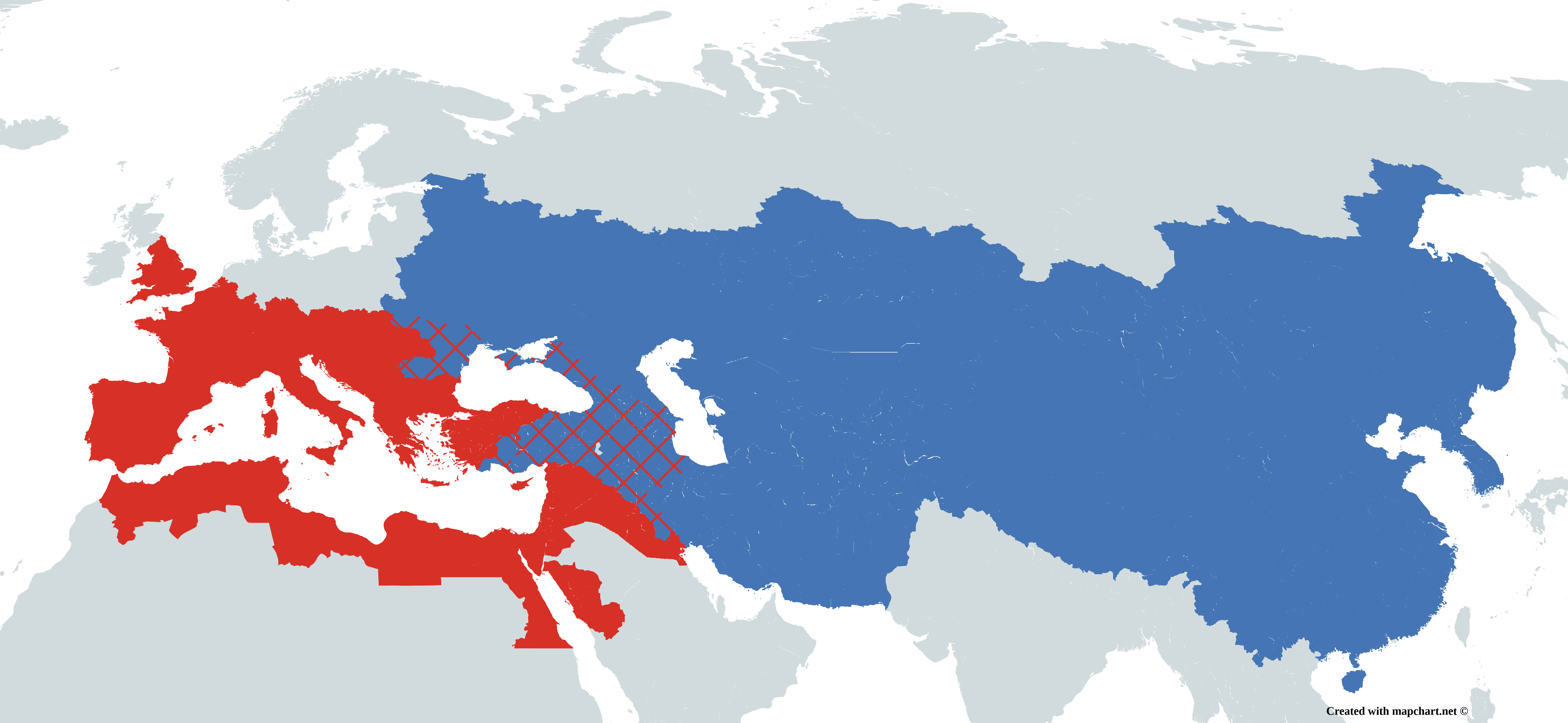The Mongol Empire and Ottoman Empire were two powerful empires in the history of the Eastern world. The Mongol Empire originated in Central Asia, while the Ottoman Empire originated in what is now Turkey. The Mongol Empire was known for its military prowess and conquering large parts of Asia and Eastern Europe with ease. The Ottoman Empire gradually expanded its territory with its formidable navy and military might. Both empires had highly centralized government structures with supreme rulers, councils of advisers, and governors of provinces. The Mongols had a nomadic lifestyle, emphasizing military conquest and governance based on meritocracy. The Ottomans had a settled lifestyle emphasizing art, literature, and architecture, and stratified society based on birth and occupation. Both left a lasting impact on their regions, with the Mongols facilitating cultural and economic exchange, and the Ottomans contributing to the development of Islamic culture and civilization.
The Mongol Empire vs. The Ottoman Empire: A Comparison of Two Great Empires of the Eastern World
Introduction
The Mongol Empire and the Ottoman Empire were two of the most powerful and influential empires in the history of the Eastern world. Both empires were conquerors and builders, and they left a lasting impact on their respective regions. Despite their many differences, there were also many similarities between the Mongol Empire and the Ottoman Empire. In this article, we will compare and contrast these two great empires.
Geography and Origins
The Mongol Empire and the Ottoman Empire had very different geographical origins. The Mongol Empire originated in the vast steppe lands of Central Asia, a region characterized by an arid climate and nomadic lifestyles. The Ottoman Empire, on the other hand, originated in the Middle East, specifically in what is now Turkey.
Mongol Empire
The Mongol Empire was founded by Genghis Khan in 1206. At its height, the Mongol Empire covered a region stretching from China in the east to Europe in the west. The Mongol Empire was known for its unparalleled military prowess, and it conquered much of Asia and Eastern Europe with relative ease.
Ottoman Empire
The Ottoman Empire was founded by Osman I in 1299. The Ottomans gradually expanded their territory through a series of conquests and alliances, eventually becoming one of the most powerful empires in the world. The Ottoman Empire was known for its military might, its cultural achievements, and its formidable navy.
Government and Administration
The Mongol Empire and the Ottoman Empire had very different governmental structures and administrative systems.
Mongol Empire
The Mongol Empire was a highly centralized empire with a supreme ruler, the Khan, who maintained absolute control over his subjects. The Khan was assisted by a council of advisers who helped him make decisions. The Mongol Empire was divided into four administrative regions, each of which was governed by a separate official.
Ottoman Empire
The Ottoman Empire was also highly centralized, with the Sultan (the ruling monarch) holding ultimate power. The Sultan had a council of advisers, known as the Divan, which assisted him in decision-making. The Ottoman Empire was divided into provinces, each of which was governed by a governor appointed by the Sultan.
Society and Culture
The Mongol Empire and the Ottoman Empire also had distinct social and cultural characteristics.
Mongol Empire
The Mongol Empire was characterized by a nomadic lifestyle, with people living in yurts and moving constantly in search of pasture for their livestock. The Mongol Empire was also known for its fierce warrior culture, with a strong emphasis on military prowess and conquest. The Mongols had a unique system of governance, with meritocracy playing a significant role in the appointment of officials.
Ottoman Empire
The Ottoman Empire was characterized by a more settled lifestyle, with the majority of the population living in cities. The Ottomans were famous for their achievements in art, literature, and architecture, and the Islamic religion played a significant role in their culture. The Ottomans had a highly stratified society, with social status based on birth and occupation.
Legacy and Impact
Both empires left a lasting impact on their respective regions and on world history.
Mongol Empire
The Mongol Empire left a legacy of military conquest, with their armies conquering large parts of Asia and Eastern Europe. The Mongols also played a significant role in facilitating the spread of cultural and economic exchange between East and West.
Ottoman Empire
The Ottoman Empire left a lasting impact on the Middle East and Europe, with its influence still felt in the region today. The Ottomans contributed to the development of Islamic culture and civilization, and they also played a significant role in shaping the political landscape of Europe through their conquests.
Conclusion
In conclusion, while the Mongol Empire and the Ottoman Empire had many differences, they were also similar in many ways. Both empires were conquerors and builders, leaving a lasting impact on their respective regions. Despite their eventual decline and fall, their achievements and legacies continue to be felt today.
